Leadership and Management for Service Industries: Thomas Cook Group
VerifiedAdded on 2020/10/22
|11
|3881
|429
Report
AI Summary
This report provides a comprehensive analysis of leadership and management principles within the service industry, using the Thomas Cook Group as a case study. It begins by assessing classical management theories, explaining the roles of leaders and different leadership styles like autocratic, democratic, and laissez-faire. The report then delves into the internal and external factors influencing management styles and organizational structures, such as employees, government policies, and customer needs. It further evaluates current hard and soft skills required for effective management and leadership in the service sector, including customer service and flexibility, and discusses the future skills needed. Finally, the report compares different service industry organizations' change management systems and leadership approaches to implementing change. Overall, the report offers valuable insights into how effective leadership and management contribute to organizational success in the service industry.
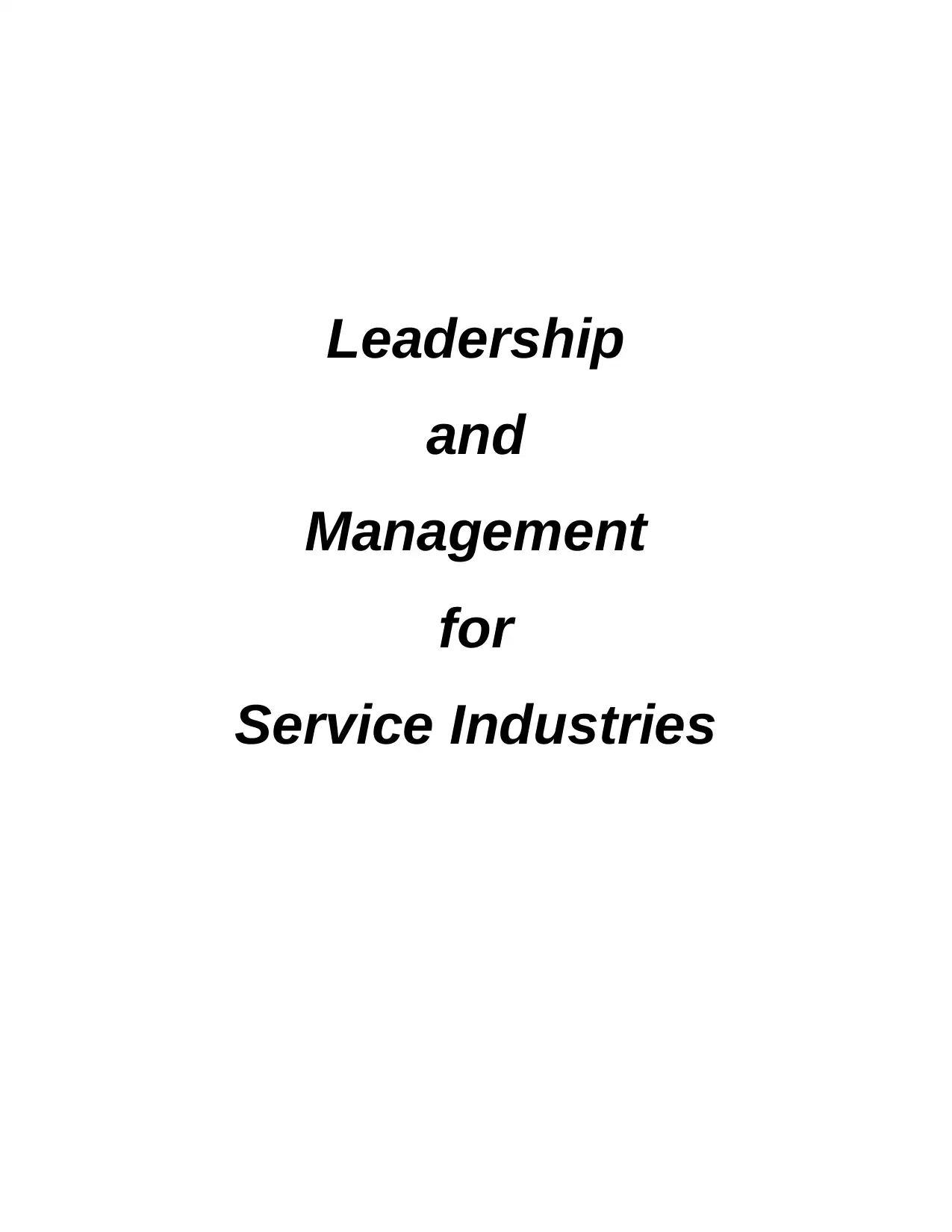
Leadership
and
Management
for
Service Industries
and
Management
for
Service Industries
Paraphrase This Document
Need a fresh take? Get an instant paraphrase of this document with our AI Paraphraser
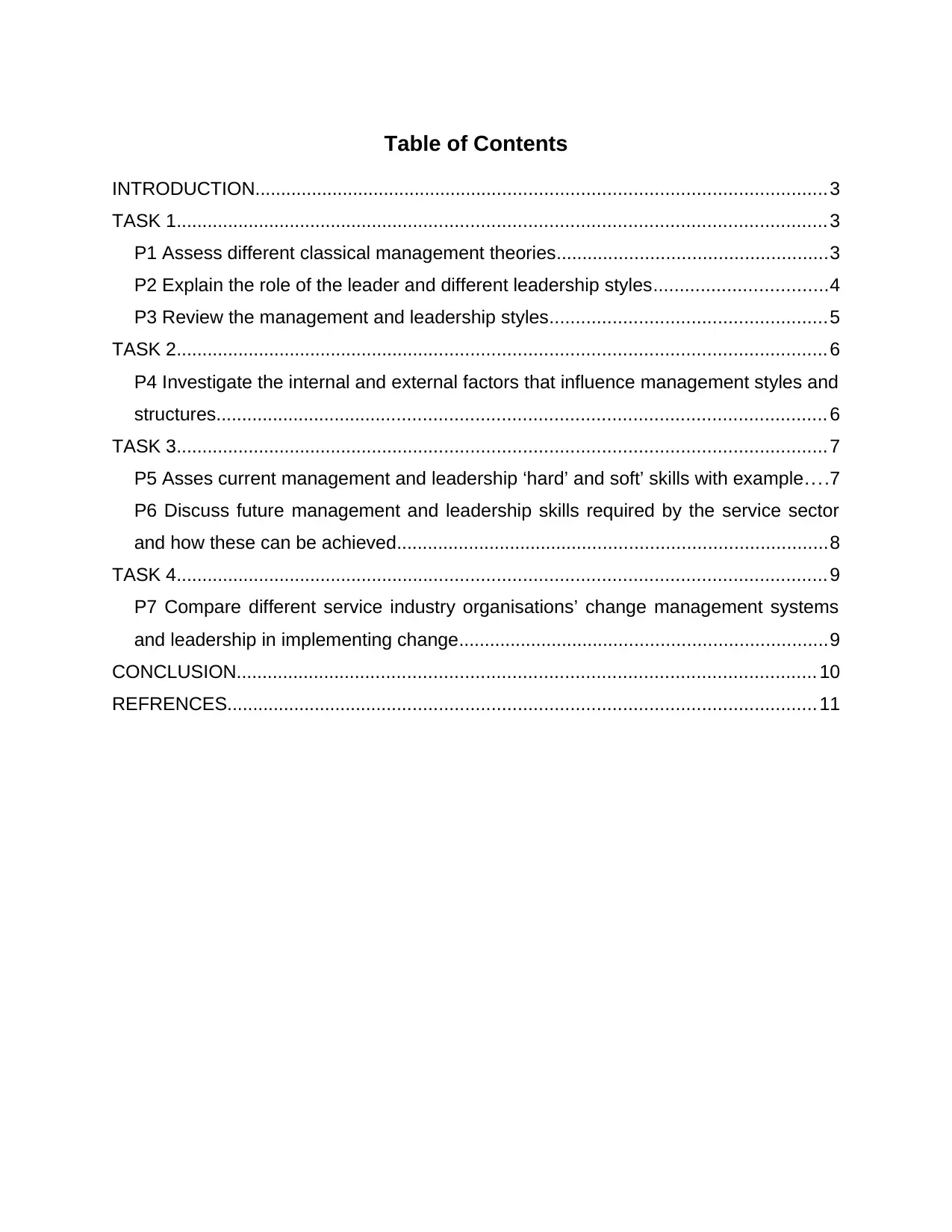
Table of Contents
INTRODUCTION..............................................................................................................3
TASK 1.............................................................................................................................3
P1 Assess different classical management theories....................................................3
P2 Explain the role of the leader and different leadership styles.................................4
P3 Review the management and leadership styles.....................................................5
TASK 2.............................................................................................................................6
P4 Investigate the internal and external factors that influence management styles and
structures..................................................................................................................... 6
TASK 3.............................................................................................................................7
P5 Asses current management and leadership ‘hard’ and soft’ skills with example....7
P6 Discuss future management and leadership skills required by the service sector
and how these can be achieved...................................................................................8
TASK 4.............................................................................................................................9
P7 Compare different service industry organisations’ change management systems
and leadership in implementing change.......................................................................9
CONCLUSION............................................................................................................... 10
REFRENCES................................................................................................................. 11
INTRODUCTION..............................................................................................................3
TASK 1.............................................................................................................................3
P1 Assess different classical management theories....................................................3
P2 Explain the role of the leader and different leadership styles.................................4
P3 Review the management and leadership styles.....................................................5
TASK 2.............................................................................................................................6
P4 Investigate the internal and external factors that influence management styles and
structures..................................................................................................................... 6
TASK 3.............................................................................................................................7
P5 Asses current management and leadership ‘hard’ and soft’ skills with example....7
P6 Discuss future management and leadership skills required by the service sector
and how these can be achieved...................................................................................8
TASK 4.............................................................................................................................9
P7 Compare different service industry organisations’ change management systems
and leadership in implementing change.......................................................................9
CONCLUSION............................................................................................................... 10
REFRENCES................................................................................................................. 11
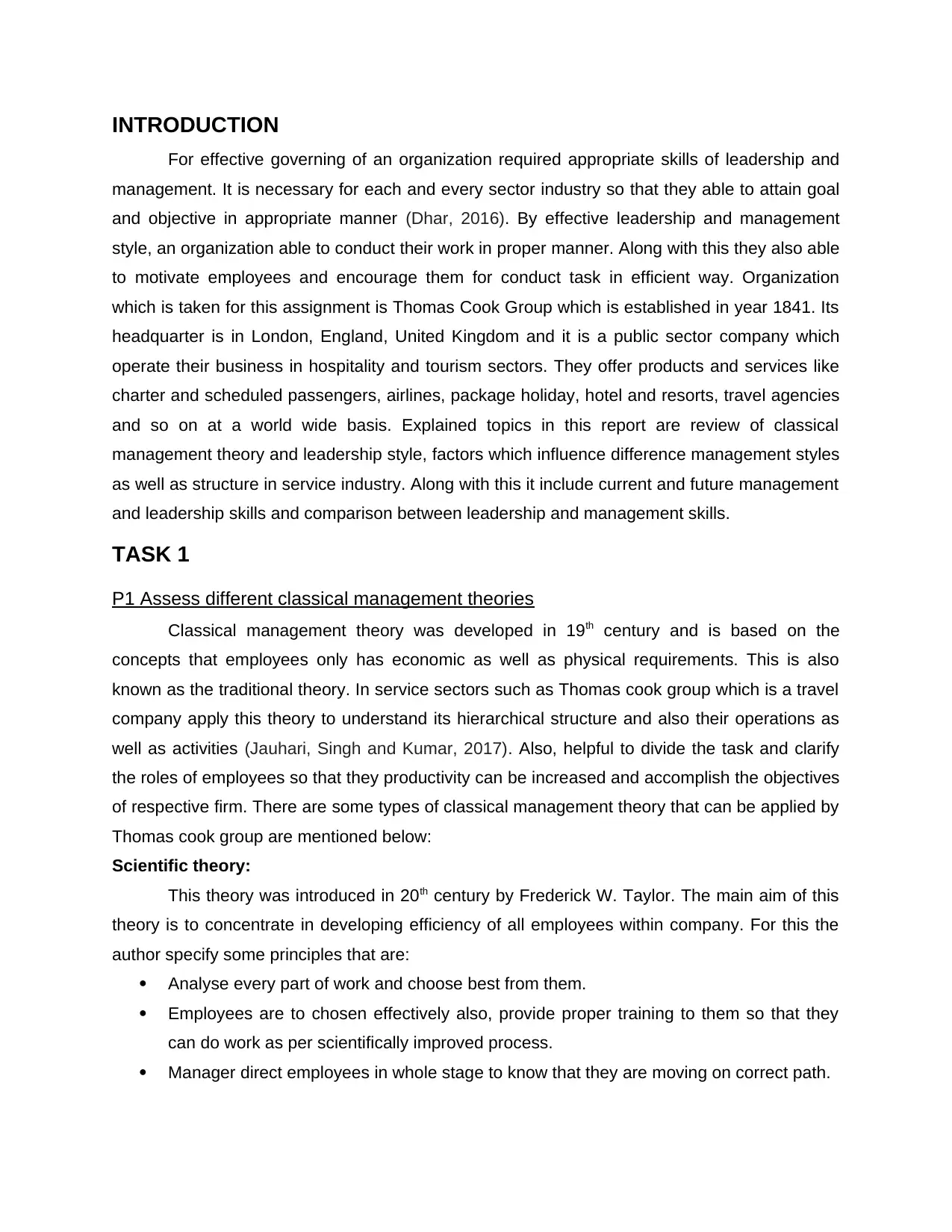
INTRODUCTION
For effective governing of an organization required appropriate skills of leadership and
management. It is necessary for each and every sector industry so that they able to attain goal
and objective in appropriate manner (Dhar, 2016). By effective leadership and management
style, an organization able to conduct their work in proper manner. Along with this they also able
to motivate employees and encourage them for conduct task in efficient way. Organization
which is taken for this assignment is Thomas Cook Group which is established in year 1841. Its
headquarter is in London, England, United Kingdom and it is a public sector company which
operate their business in hospitality and tourism sectors. They offer products and services like
charter and scheduled passengers, airlines, package holiday, hotel and resorts, travel agencies
and so on at a world wide basis. Explained topics in this report are review of classical
management theory and leadership style, factors which influence difference management styles
as well as structure in service industry. Along with this it include current and future management
and leadership skills and comparison between leadership and management skills.
TASK 1
P1 Assess different classical management theories
Classical management theory was developed in 19th century and is based on the
concepts that employees only has economic as well as physical requirements. This is also
known as the traditional theory. In service sectors such as Thomas cook group which is a travel
company apply this theory to understand its hierarchical structure and also their operations as
well as activities (Jauhari, Singh and Kumar, 2017). Also, helpful to divide the task and clarify
the roles of employees so that they productivity can be increased and accomplish the objectives
of respective firm. There are some types of classical management theory that can be applied by
Thomas cook group are mentioned below:
Scientific theory:
This theory was introduced in 20th century by Frederick W. Taylor. The main aim of this
theory is to concentrate in developing efficiency of all employees within company. For this the
author specify some principles that are:
Analyse every part of work and choose best from them.
Employees are to chosen effectively also, provide proper training to them so that they
can do work as per scientifically improved process.
Manager direct employees in whole stage to know that they are moving on correct path.
For effective governing of an organization required appropriate skills of leadership and
management. It is necessary for each and every sector industry so that they able to attain goal
and objective in appropriate manner (Dhar, 2016). By effective leadership and management
style, an organization able to conduct their work in proper manner. Along with this they also able
to motivate employees and encourage them for conduct task in efficient way. Organization
which is taken for this assignment is Thomas Cook Group which is established in year 1841. Its
headquarter is in London, England, United Kingdom and it is a public sector company which
operate their business in hospitality and tourism sectors. They offer products and services like
charter and scheduled passengers, airlines, package holiday, hotel and resorts, travel agencies
and so on at a world wide basis. Explained topics in this report are review of classical
management theory and leadership style, factors which influence difference management styles
as well as structure in service industry. Along with this it include current and future management
and leadership skills and comparison between leadership and management skills.
TASK 1
P1 Assess different classical management theories
Classical management theory was developed in 19th century and is based on the
concepts that employees only has economic as well as physical requirements. This is also
known as the traditional theory. In service sectors such as Thomas cook group which is a travel
company apply this theory to understand its hierarchical structure and also their operations as
well as activities (Jauhari, Singh and Kumar, 2017). Also, helpful to divide the task and clarify
the roles of employees so that they productivity can be increased and accomplish the objectives
of respective firm. There are some types of classical management theory that can be applied by
Thomas cook group are mentioned below:
Scientific theory:
This theory was introduced in 20th century by Frederick W. Taylor. The main aim of this
theory is to concentrate in developing efficiency of all employees within company. For this the
author specify some principles that are:
Analyse every part of work and choose best from them.
Employees are to chosen effectively also, provide proper training to them so that they
can do work as per scientifically improved process.
Manager direct employees in whole stage to know that they are moving on correct path.
⊘ This is a preview!⊘
Do you want full access?
Subscribe today to unlock all pages.

Trusted by 1+ million students worldwide
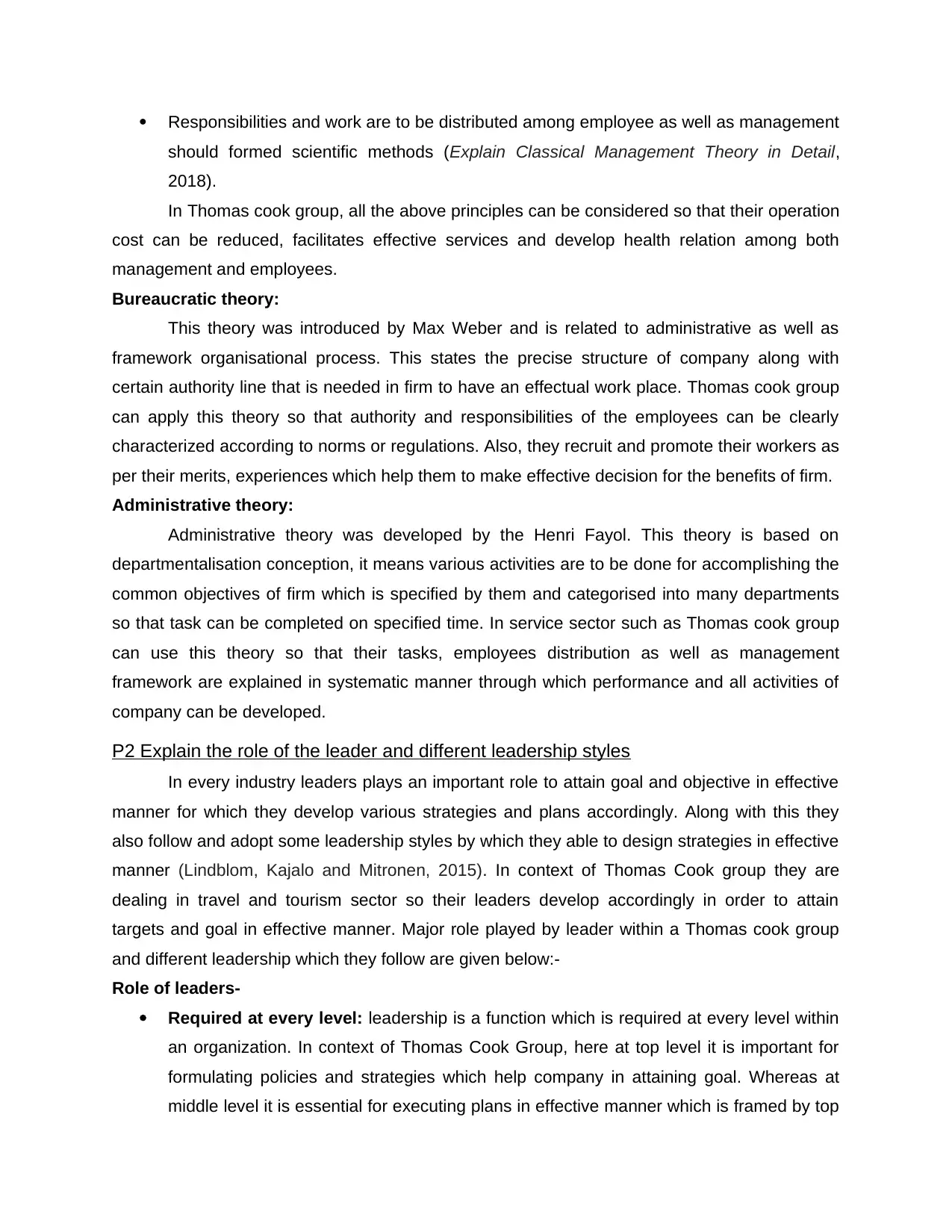
Responsibilities and work are to be distributed among employee as well as management
should formed scientific methods (Explain Classical Management Theory in Detail,
2018).
In Thomas cook group, all the above principles can be considered so that their operation
cost can be reduced, facilitates effective services and develop health relation among both
management and employees.
Bureaucratic theory:
This theory was introduced by Max Weber and is related to administrative as well as
framework organisational process. This states the precise structure of company along with
certain authority line that is needed in firm to have an effectual work place. Thomas cook group
can apply this theory so that authority and responsibilities of the employees can be clearly
characterized according to norms or regulations. Also, they recruit and promote their workers as
per their merits, experiences which help them to make effective decision for the benefits of firm.
Administrative theory:
Administrative theory was developed by the Henri Fayol. This theory is based on
departmentalisation conception, it means various activities are to be done for accomplishing the
common objectives of firm which is specified by them and categorised into many departments
so that task can be completed on specified time. In service sector such as Thomas cook group
can use this theory so that their tasks, employees distribution as well as management
framework are explained in systematic manner through which performance and all activities of
company can be developed.
P2 Explain the role of the leader and different leadership styles
In every industry leaders plays an important role to attain goal and objective in effective
manner for which they develop various strategies and plans accordingly. Along with this they
also follow and adopt some leadership styles by which they able to design strategies in effective
manner (Lindblom, Kajalo and Mitronen, 2015). In context of Thomas Cook group they are
dealing in travel and tourism sector so their leaders develop accordingly in order to attain
targets and goal in effective manner. Major role played by leader within a Thomas cook group
and different leadership which they follow are given below:-
Role of leaders-
Required at every level: leadership is a function which is required at every level within
an organization. In context of Thomas Cook Group, here at top level it is important for
formulating policies and strategies which help company in attaining goal. Whereas at
middle level it is essential for executing plans in effective manner which is framed by top
should formed scientific methods (Explain Classical Management Theory in Detail,
2018).
In Thomas cook group, all the above principles can be considered so that their operation
cost can be reduced, facilitates effective services and develop health relation among both
management and employees.
Bureaucratic theory:
This theory was introduced by Max Weber and is related to administrative as well as
framework organisational process. This states the precise structure of company along with
certain authority line that is needed in firm to have an effectual work place. Thomas cook group
can apply this theory so that authority and responsibilities of the employees can be clearly
characterized according to norms or regulations. Also, they recruit and promote their workers as
per their merits, experiences which help them to make effective decision for the benefits of firm.
Administrative theory:
Administrative theory was developed by the Henri Fayol. This theory is based on
departmentalisation conception, it means various activities are to be done for accomplishing the
common objectives of firm which is specified by them and categorised into many departments
so that task can be completed on specified time. In service sector such as Thomas cook group
can use this theory so that their tasks, employees distribution as well as management
framework are explained in systematic manner through which performance and all activities of
company can be developed.
P2 Explain the role of the leader and different leadership styles
In every industry leaders plays an important role to attain goal and objective in effective
manner for which they develop various strategies and plans accordingly. Along with this they
also follow and adopt some leadership styles by which they able to design strategies in effective
manner (Lindblom, Kajalo and Mitronen, 2015). In context of Thomas Cook group they are
dealing in travel and tourism sector so their leaders develop accordingly in order to attain
targets and goal in effective manner. Major role played by leader within a Thomas cook group
and different leadership which they follow are given below:-
Role of leaders-
Required at every level: leadership is a function which is required at every level within
an organization. In context of Thomas Cook Group, here at top level it is important for
formulating policies and strategies which help company in attaining goal. Whereas at
middle level it is essential for executing plans in effective manner which is framed by top
Paraphrase This Document
Need a fresh take? Get an instant paraphrase of this document with our AI Paraphraser
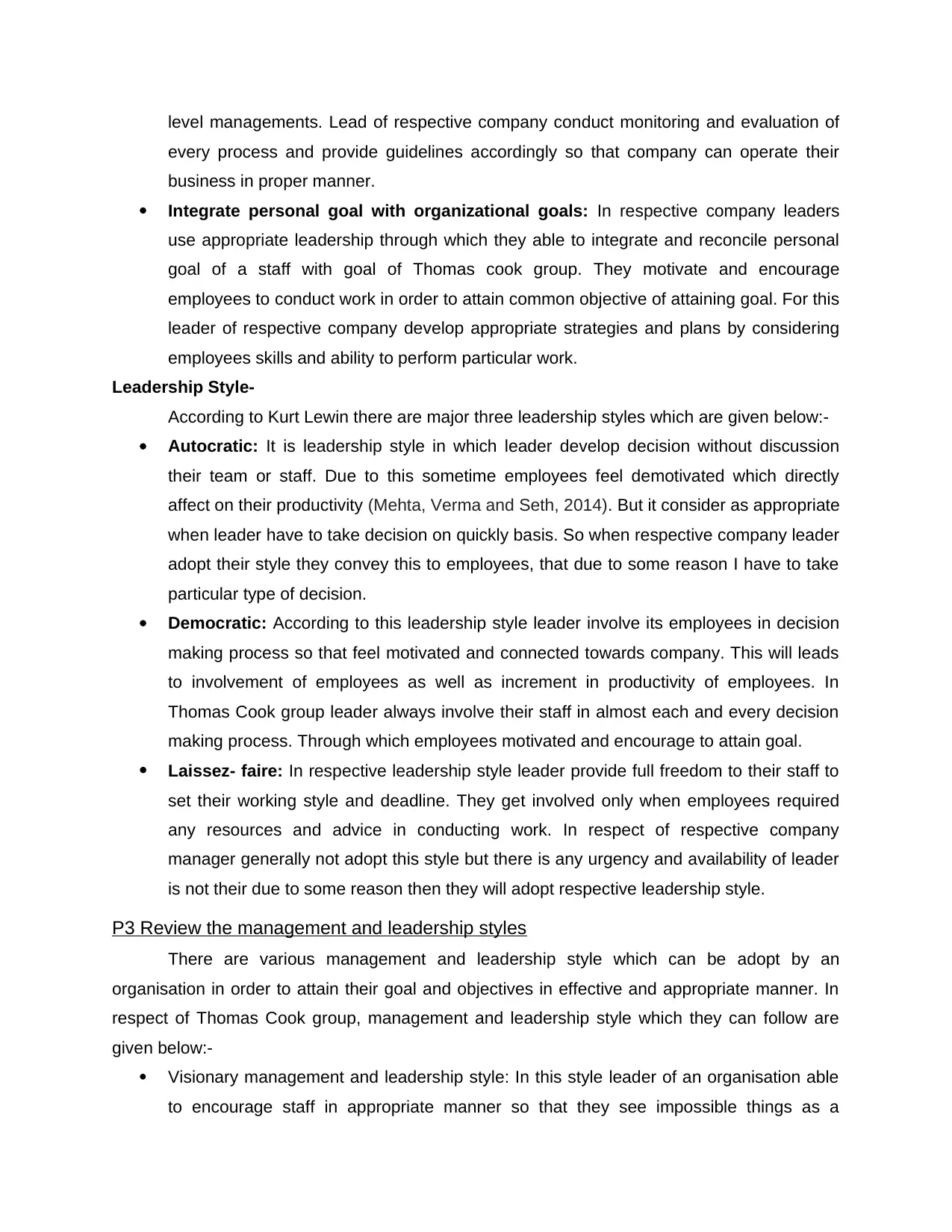
level managements. Lead of respective company conduct monitoring and evaluation of
every process and provide guidelines accordingly so that company can operate their
business in proper manner.
Integrate personal goal with organizational goals: In respective company leaders
use appropriate leadership through which they able to integrate and reconcile personal
goal of a staff with goal of Thomas cook group. They motivate and encourage
employees to conduct work in order to attain common objective of attaining goal. For this
leader of respective company develop appropriate strategies and plans by considering
employees skills and ability to perform particular work.
Leadership Style-
According to Kurt Lewin there are major three leadership styles which are given below:-
Autocratic: It is leadership style in which leader develop decision without discussion
their team or staff. Due to this sometime employees feel demotivated which directly
affect on their productivity (Mehta, Verma and Seth, 2014). But it consider as appropriate
when leader have to take decision on quickly basis. So when respective company leader
adopt their style they convey this to employees, that due to some reason I have to take
particular type of decision.
Democratic: According to this leadership style leader involve its employees in decision
making process so that feel motivated and connected towards company. This will leads
to involvement of employees as well as increment in productivity of employees. In
Thomas Cook group leader always involve their staff in almost each and every decision
making process. Through which employees motivated and encourage to attain goal.
Laissez- faire: In respective leadership style leader provide full freedom to their staff to
set their working style and deadline. They get involved only when employees required
any resources and advice in conducting work. In respect of respective company
manager generally not adopt this style but there is any urgency and availability of leader
is not their due to some reason then they will adopt respective leadership style.
P3 Review the management and leadership styles
There are various management and leadership style which can be adopt by an
organisation in order to attain their goal and objectives in effective and appropriate manner. In
respect of Thomas Cook group, management and leadership style which they can follow are
given below:-
Visionary management and leadership style: In this style leader of an organisation able
to encourage staff in appropriate manner so that they see impossible things as a
every process and provide guidelines accordingly so that company can operate their
business in proper manner.
Integrate personal goal with organizational goals: In respective company leaders
use appropriate leadership through which they able to integrate and reconcile personal
goal of a staff with goal of Thomas cook group. They motivate and encourage
employees to conduct work in order to attain common objective of attaining goal. For this
leader of respective company develop appropriate strategies and plans by considering
employees skills and ability to perform particular work.
Leadership Style-
According to Kurt Lewin there are major three leadership styles which are given below:-
Autocratic: It is leadership style in which leader develop decision without discussion
their team or staff. Due to this sometime employees feel demotivated which directly
affect on their productivity (Mehta, Verma and Seth, 2014). But it consider as appropriate
when leader have to take decision on quickly basis. So when respective company leader
adopt their style they convey this to employees, that due to some reason I have to take
particular type of decision.
Democratic: According to this leadership style leader involve its employees in decision
making process so that feel motivated and connected towards company. This will leads
to involvement of employees as well as increment in productivity of employees. In
Thomas Cook group leader always involve their staff in almost each and every decision
making process. Through which employees motivated and encourage to attain goal.
Laissez- faire: In respective leadership style leader provide full freedom to their staff to
set their working style and deadline. They get involved only when employees required
any resources and advice in conducting work. In respect of respective company
manager generally not adopt this style but there is any urgency and availability of leader
is not their due to some reason then they will adopt respective leadership style.
P3 Review the management and leadership styles
There are various management and leadership style which can be adopt by an
organisation in order to attain their goal and objectives in effective and appropriate manner. In
respect of Thomas Cook group, management and leadership style which they can follow are
given below:-
Visionary management and leadership style: In this style leader of an organisation able
to encourage staff in appropriate manner so that they see impossible things as a
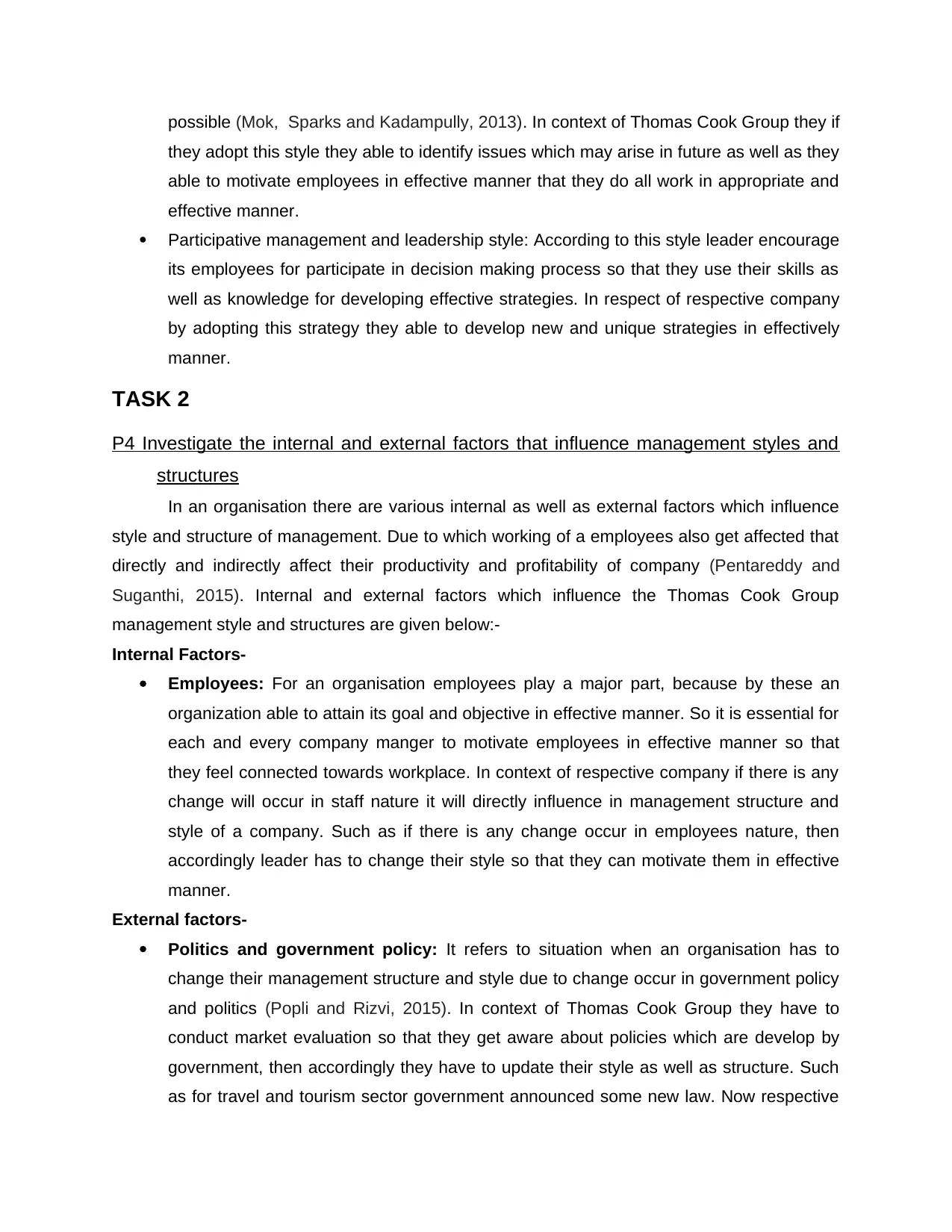
possible (Mok, Sparks and Kadampully, 2013). In context of Thomas Cook Group they if
they adopt this style they able to identify issues which may arise in future as well as they
able to motivate employees in effective manner that they do all work in appropriate and
effective manner.
Participative management and leadership style: According to this style leader encourage
its employees for participate in decision making process so that they use their skills as
well as knowledge for developing effective strategies. In respect of respective company
by adopting this strategy they able to develop new and unique strategies in effectively
manner.
TASK 2
P4 Investigate the internal and external factors that influence management styles and
structures
In an organisation there are various internal as well as external factors which influence
style and structure of management. Due to which working of a employees also get affected that
directly and indirectly affect their productivity and profitability of company (Pentareddy and
Suganthi, 2015). Internal and external factors which influence the Thomas Cook Group
management style and structures are given below:-
Internal Factors-
Employees: For an organisation employees play a major part, because by these an
organization able to attain its goal and objective in effective manner. So it is essential for
each and every company manger to motivate employees in effective manner so that
they feel connected towards workplace. In context of respective company if there is any
change will occur in staff nature it will directly influence in management structure and
style of a company. Such as if there is any change occur in employees nature, then
accordingly leader has to change their style so that they can motivate them in effective
manner.
External factors-
Politics and government policy: It refers to situation when an organisation has to
change their management structure and style due to change occur in government policy
and politics (Popli and Rizvi, 2015). In context of Thomas Cook Group they have to
conduct market evaluation so that they get aware about policies which are develop by
government, then accordingly they have to update their style as well as structure. Such
as for travel and tourism sector government announced some new law. Now respective
they adopt this style they able to identify issues which may arise in future as well as they
able to motivate employees in effective manner that they do all work in appropriate and
effective manner.
Participative management and leadership style: According to this style leader encourage
its employees for participate in decision making process so that they use their skills as
well as knowledge for developing effective strategies. In respect of respective company
by adopting this strategy they able to develop new and unique strategies in effectively
manner.
TASK 2
P4 Investigate the internal and external factors that influence management styles and
structures
In an organisation there are various internal as well as external factors which influence
style and structure of management. Due to which working of a employees also get affected that
directly and indirectly affect their productivity and profitability of company (Pentareddy and
Suganthi, 2015). Internal and external factors which influence the Thomas Cook Group
management style and structures are given below:-
Internal Factors-
Employees: For an organisation employees play a major part, because by these an
organization able to attain its goal and objective in effective manner. So it is essential for
each and every company manger to motivate employees in effective manner so that
they feel connected towards workplace. In context of respective company if there is any
change will occur in staff nature it will directly influence in management structure and
style of a company. Such as if there is any change occur in employees nature, then
accordingly leader has to change their style so that they can motivate them in effective
manner.
External factors-
Politics and government policy: It refers to situation when an organisation has to
change their management structure and style due to change occur in government policy
and politics (Popli and Rizvi, 2015). In context of Thomas Cook Group they have to
conduct market evaluation so that they get aware about policies which are develop by
government, then accordingly they have to update their style as well as structure. Such
as for travel and tourism sector government announced some new law. Now respective
⊘ This is a preview!⊘
Do you want full access?
Subscribe today to unlock all pages.

Trusted by 1+ million students worldwide
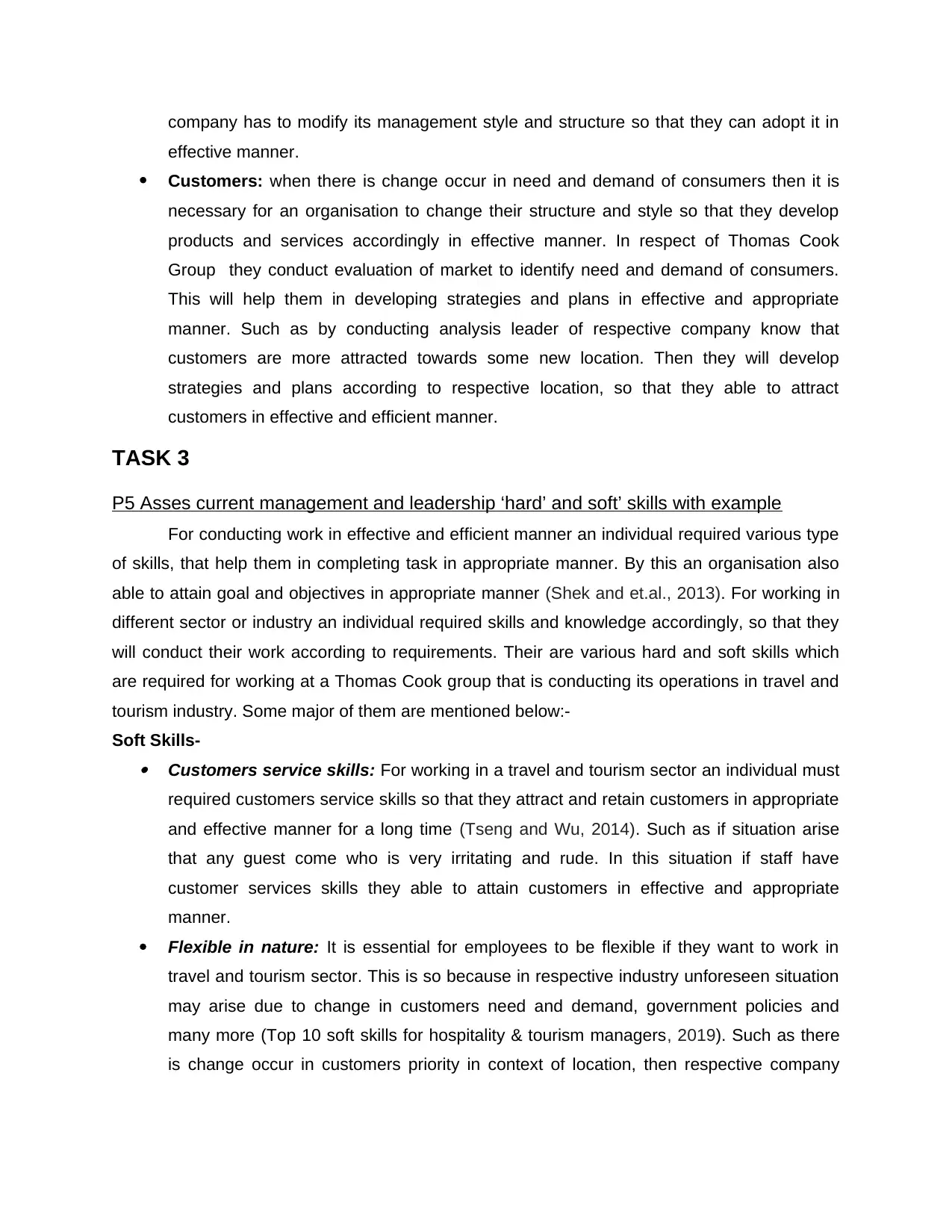
company has to modify its management style and structure so that they can adopt it in
effective manner.
Customers: when there is change occur in need and demand of consumers then it is
necessary for an organisation to change their structure and style so that they develop
products and services accordingly in effective manner. In respect of Thomas Cook
Group they conduct evaluation of market to identify need and demand of consumers.
This will help them in developing strategies and plans in effective and appropriate
manner. Such as by conducting analysis leader of respective company know that
customers are more attracted towards some new location. Then they will develop
strategies and plans according to respective location, so that they able to attract
customers in effective and efficient manner.
TASK 3
P5 Asses current management and leadership ‘hard’ and soft’ skills with example
For conducting work in effective and efficient manner an individual required various type
of skills, that help them in completing task in appropriate manner. By this an organisation also
able to attain goal and objectives in appropriate manner (Shek and et.al., 2013). For working in
different sector or industry an individual required skills and knowledge accordingly, so that they
will conduct their work according to requirements. Their are various hard and soft skills which
are required for working at a Thomas Cook group that is conducting its operations in travel and
tourism industry. Some major of them are mentioned below:-
Soft Skills- Customers service skills: For working in a travel and tourism sector an individual must
required customers service skills so that they attract and retain customers in appropriate
and effective manner for a long time (Tseng and Wu, 2014). Such as if situation arise
that any guest come who is very irritating and rude. In this situation if staff have
customer services skills they able to attain customers in effective and appropriate
manner.
Flexible in nature: It is essential for employees to be flexible if they want to work in
travel and tourism sector. This is so because in respective industry unforeseen situation
may arise due to change in customers need and demand, government policies and
many more (Top 10 soft skills for hospitality & tourism managers, 2019). Such as there
is change occur in customers priority in context of location, then respective company
effective manner.
Customers: when there is change occur in need and demand of consumers then it is
necessary for an organisation to change their structure and style so that they develop
products and services accordingly in effective manner. In respect of Thomas Cook
Group they conduct evaluation of market to identify need and demand of consumers.
This will help them in developing strategies and plans in effective and appropriate
manner. Such as by conducting analysis leader of respective company know that
customers are more attracted towards some new location. Then they will develop
strategies and plans according to respective location, so that they able to attract
customers in effective and efficient manner.
TASK 3
P5 Asses current management and leadership ‘hard’ and soft’ skills with example
For conducting work in effective and efficient manner an individual required various type
of skills, that help them in completing task in appropriate manner. By this an organisation also
able to attain goal and objectives in appropriate manner (Shek and et.al., 2013). For working in
different sector or industry an individual required skills and knowledge accordingly, so that they
will conduct their work according to requirements. Their are various hard and soft skills which
are required for working at a Thomas Cook group that is conducting its operations in travel and
tourism industry. Some major of them are mentioned below:-
Soft Skills- Customers service skills: For working in a travel and tourism sector an individual must
required customers service skills so that they attract and retain customers in appropriate
and effective manner for a long time (Tseng and Wu, 2014). Such as if situation arise
that any guest come who is very irritating and rude. In this situation if staff have
customer services skills they able to attain customers in effective and appropriate
manner.
Flexible in nature: It is essential for employees to be flexible if they want to work in
travel and tourism sector. This is so because in respective industry unforeseen situation
may arise due to change in customers need and demand, government policies and
many more (Top 10 soft skills for hospitality & tourism managers, 2019). Such as there
is change occur in customers priority in context of location, then respective company
Paraphrase This Document
Need a fresh take? Get an instant paraphrase of this document with our AI Paraphraser
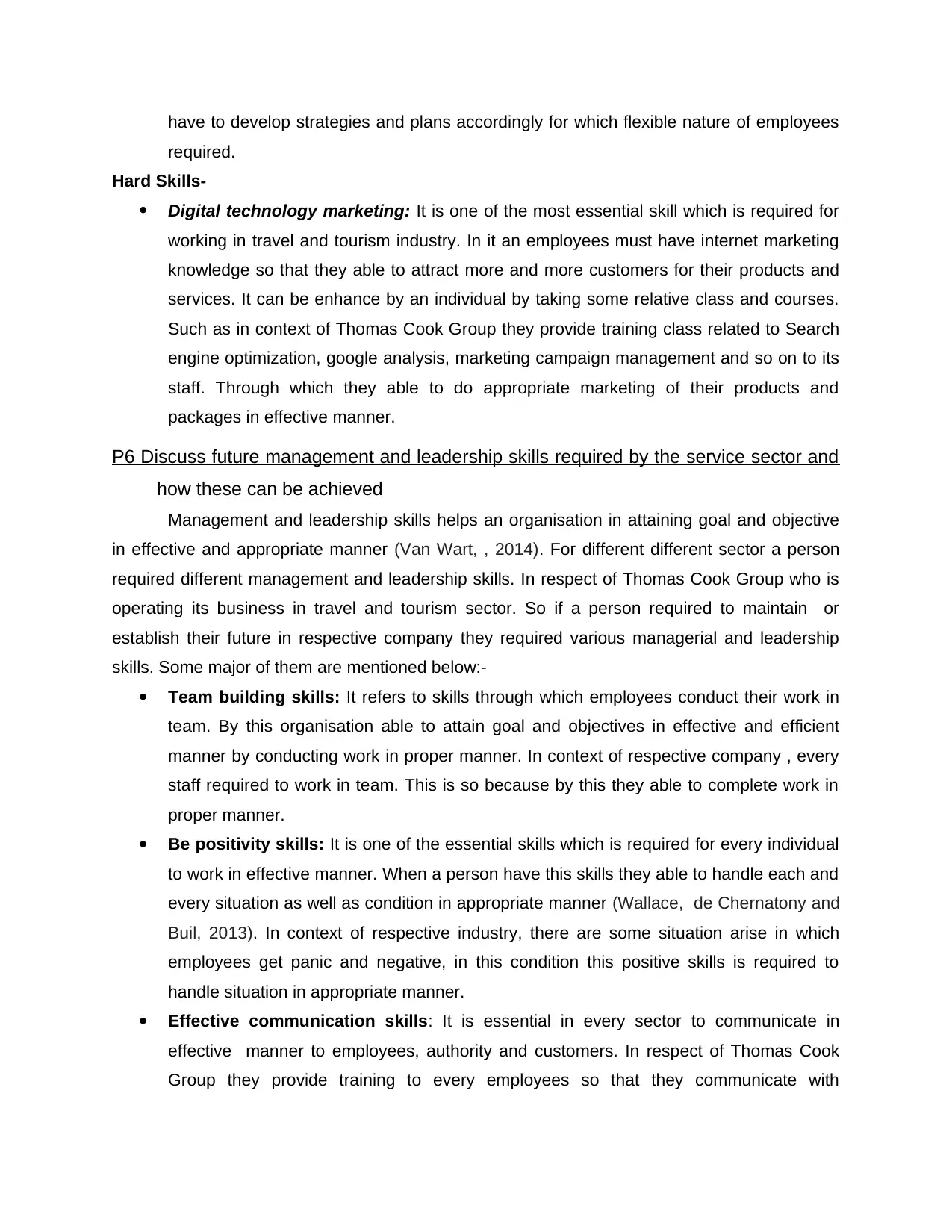
have to develop strategies and plans accordingly for which flexible nature of employees
required.
Hard Skills-
Digital technology marketing: It is one of the most essential skill which is required for
working in travel and tourism industry. In it an employees must have internet marketing
knowledge so that they able to attract more and more customers for their products and
services. It can be enhance by an individual by taking some relative class and courses.
Such as in context of Thomas Cook Group they provide training class related to Search
engine optimization, google analysis, marketing campaign management and so on to its
staff. Through which they able to do appropriate marketing of their products and
packages in effective manner.
P6 Discuss future management and leadership skills required by the service sector and
how these can be achieved
Management and leadership skills helps an organisation in attaining goal and objective
in effective and appropriate manner (Van Wart, , 2014). For different different sector a person
required different management and leadership skills. In respect of Thomas Cook Group who is
operating its business in travel and tourism sector. So if a person required to maintain or
establish their future in respective company they required various managerial and leadership
skills. Some major of them are mentioned below:-
Team building skills: It refers to skills through which employees conduct their work in
team. By this organisation able to attain goal and objectives in effective and efficient
manner by conducting work in proper manner. In context of respective company , every
staff required to work in team. This is so because by this they able to complete work in
proper manner.
Be positivity skills: It is one of the essential skills which is required for every individual
to work in effective manner. When a person have this skills they able to handle each and
every situation as well as condition in appropriate manner (Wallace, de Chernatony and
Buil, 2013). In context of respective industry, there are some situation arise in which
employees get panic and negative, in this condition this positive skills is required to
handle situation in appropriate manner.
Effective communication skills: It is essential in every sector to communicate in
effective manner to employees, authority and customers. In respect of Thomas Cook
Group they provide training to every employees so that they communicate with
required.
Hard Skills-
Digital technology marketing: It is one of the most essential skill which is required for
working in travel and tourism industry. In it an employees must have internet marketing
knowledge so that they able to attract more and more customers for their products and
services. It can be enhance by an individual by taking some relative class and courses.
Such as in context of Thomas Cook Group they provide training class related to Search
engine optimization, google analysis, marketing campaign management and so on to its
staff. Through which they able to do appropriate marketing of their products and
packages in effective manner.
P6 Discuss future management and leadership skills required by the service sector and
how these can be achieved
Management and leadership skills helps an organisation in attaining goal and objective
in effective and appropriate manner (Van Wart, , 2014). For different different sector a person
required different management and leadership skills. In respect of Thomas Cook Group who is
operating its business in travel and tourism sector. So if a person required to maintain or
establish their future in respective company they required various managerial and leadership
skills. Some major of them are mentioned below:-
Team building skills: It refers to skills through which employees conduct their work in
team. By this organisation able to attain goal and objectives in effective and efficient
manner by conducting work in proper manner. In context of respective company , every
staff required to work in team. This is so because by this they able to complete work in
proper manner.
Be positivity skills: It is one of the essential skills which is required for every individual
to work in effective manner. When a person have this skills they able to handle each and
every situation as well as condition in appropriate manner (Wallace, de Chernatony and
Buil, 2013). In context of respective industry, there are some situation arise in which
employees get panic and negative, in this condition this positive skills is required to
handle situation in appropriate manner.
Effective communication skills: It is essential in every sector to communicate in
effective manner to employees, authority and customers. In respect of Thomas Cook
Group they provide training to every employees so that they communicate with
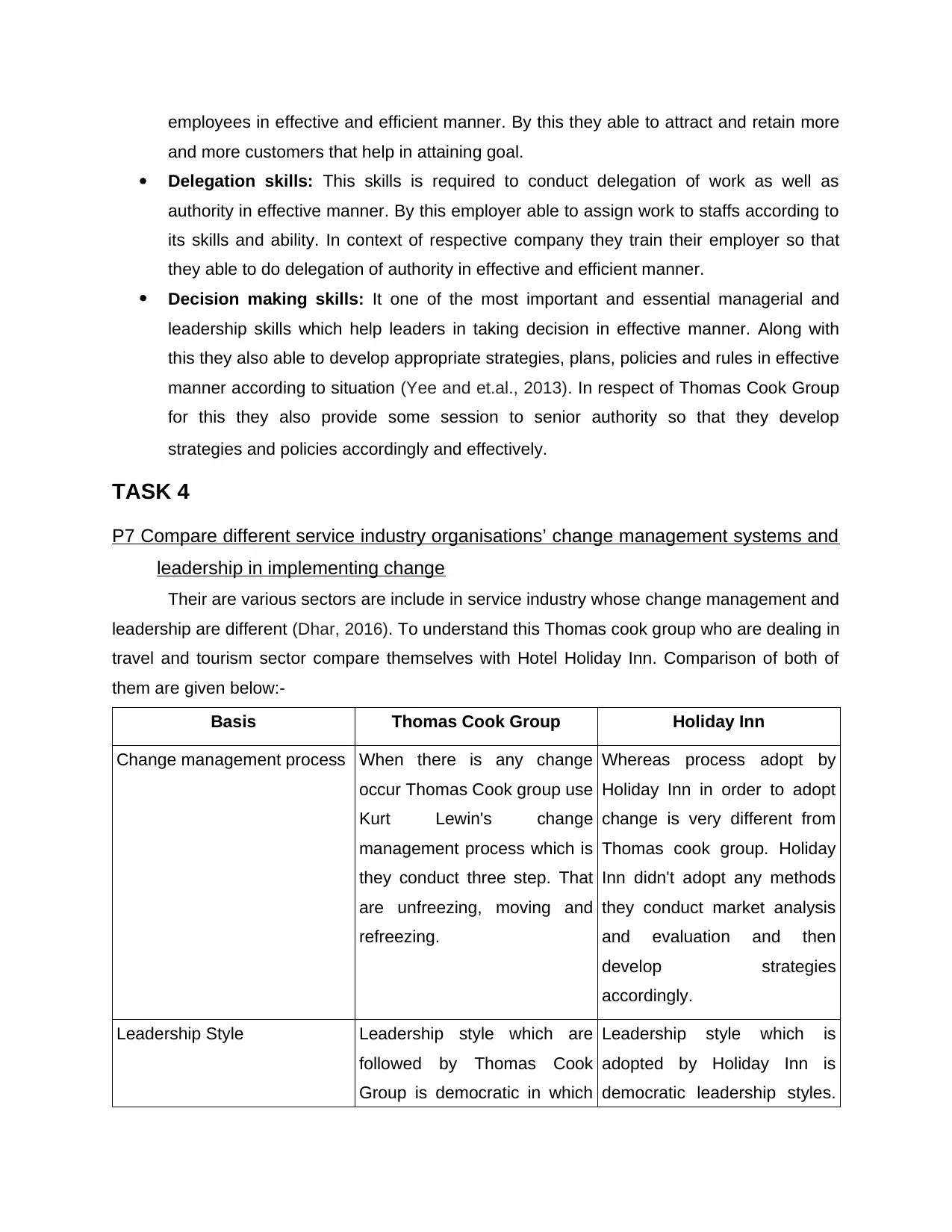
employees in effective and efficient manner. By this they able to attract and retain more
and more customers that help in attaining goal.
Delegation skills: This skills is required to conduct delegation of work as well as
authority in effective manner. By this employer able to assign work to staffs according to
its skills and ability. In context of respective company they train their employer so that
they able to do delegation of authority in effective and efficient manner.
Decision making skills: It one of the most important and essential managerial and
leadership skills which help leaders in taking decision in effective manner. Along with
this they also able to develop appropriate strategies, plans, policies and rules in effective
manner according to situation (Yee and et.al., 2013). In respect of Thomas Cook Group
for this they also provide some session to senior authority so that they develop
strategies and policies accordingly and effectively.
TASK 4
P7 Compare different service industry organisations’ change management systems and
leadership in implementing change
Their are various sectors are include in service industry whose change management and
leadership are different (Dhar, 2016). To understand this Thomas cook group who are dealing in
travel and tourism sector compare themselves with Hotel Holiday Inn. Comparison of both of
them are given below:-
Basis Thomas Cook Group Holiday Inn
Change management process When there is any change
occur Thomas Cook group use
Kurt Lewin's change
management process which is
they conduct three step. That
are unfreezing, moving and
refreezing.
Whereas process adopt by
Holiday Inn in order to adopt
change is very different from
Thomas cook group. Holiday
Inn didn't adopt any methods
they conduct market analysis
and evaluation and then
develop strategies
accordingly.
Leadership Style Leadership style which are
followed by Thomas Cook
Group is democratic in which
Leadership style which is
adopted by Holiday Inn is
democratic leadership styles.
and more customers that help in attaining goal.
Delegation skills: This skills is required to conduct delegation of work as well as
authority in effective manner. By this employer able to assign work to staffs according to
its skills and ability. In context of respective company they train their employer so that
they able to do delegation of authority in effective and efficient manner.
Decision making skills: It one of the most important and essential managerial and
leadership skills which help leaders in taking decision in effective manner. Along with
this they also able to develop appropriate strategies, plans, policies and rules in effective
manner according to situation (Yee and et.al., 2013). In respect of Thomas Cook Group
for this they also provide some session to senior authority so that they develop
strategies and policies accordingly and effectively.
TASK 4
P7 Compare different service industry organisations’ change management systems and
leadership in implementing change
Their are various sectors are include in service industry whose change management and
leadership are different (Dhar, 2016). To understand this Thomas cook group who are dealing in
travel and tourism sector compare themselves with Hotel Holiday Inn. Comparison of both of
them are given below:-
Basis Thomas Cook Group Holiday Inn
Change management process When there is any change
occur Thomas Cook group use
Kurt Lewin's change
management process which is
they conduct three step. That
are unfreezing, moving and
refreezing.
Whereas process adopt by
Holiday Inn in order to adopt
change is very different from
Thomas cook group. Holiday
Inn didn't adopt any methods
they conduct market analysis
and evaluation and then
develop strategies
accordingly.
Leadership Style Leadership style which are
followed by Thomas Cook
Group is democratic in which
Leadership style which is
adopted by Holiday Inn is
democratic leadership styles.
⊘ This is a preview!⊘
Do you want full access?
Subscribe today to unlock all pages.

Trusted by 1+ million students worldwide
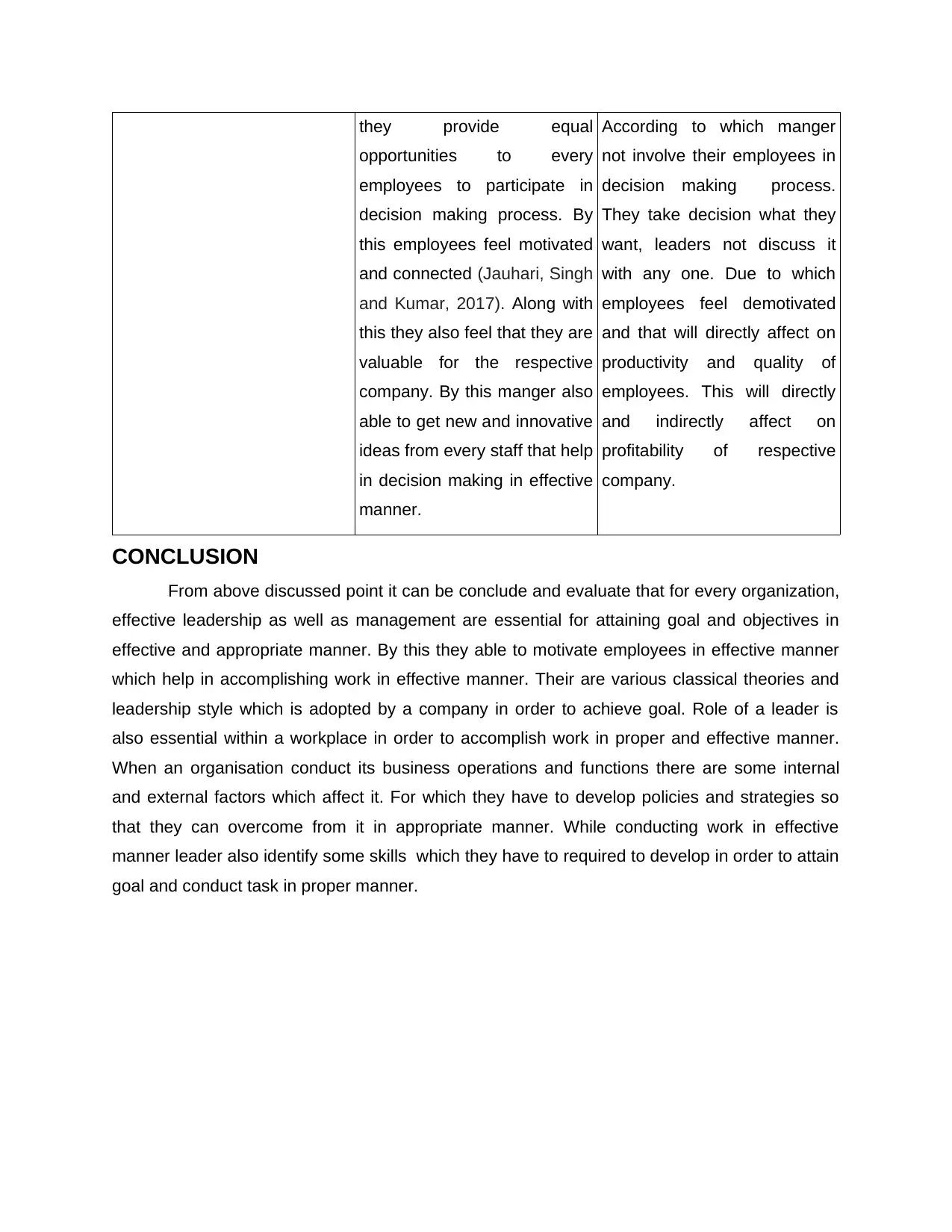
they provide equal
opportunities to every
employees to participate in
decision making process. By
this employees feel motivated
and connected (Jauhari, Singh
and Kumar, 2017). Along with
this they also feel that they are
valuable for the respective
company. By this manger also
able to get new and innovative
ideas from every staff that help
in decision making in effective
manner.
According to which manger
not involve their employees in
decision making process.
They take decision what they
want, leaders not discuss it
with any one. Due to which
employees feel demotivated
and that will directly affect on
productivity and quality of
employees. This will directly
and indirectly affect on
profitability of respective
company.
CONCLUSION
From above discussed point it can be conclude and evaluate that for every organization,
effective leadership as well as management are essential for attaining goal and objectives in
effective and appropriate manner. By this they able to motivate employees in effective manner
which help in accomplishing work in effective manner. Their are various classical theories and
leadership style which is adopted by a company in order to achieve goal. Role of a leader is
also essential within a workplace in order to accomplish work in proper and effective manner.
When an organisation conduct its business operations and functions there are some internal
and external factors which affect it. For which they have to develop policies and strategies so
that they can overcome from it in appropriate manner. While conducting work in effective
manner leader also identify some skills which they have to required to develop in order to attain
goal and conduct task in proper manner.
opportunities to every
employees to participate in
decision making process. By
this employees feel motivated
and connected (Jauhari, Singh
and Kumar, 2017). Along with
this they also feel that they are
valuable for the respective
company. By this manger also
able to get new and innovative
ideas from every staff that help
in decision making in effective
manner.
According to which manger
not involve their employees in
decision making process.
They take decision what they
want, leaders not discuss it
with any one. Due to which
employees feel demotivated
and that will directly affect on
productivity and quality of
employees. This will directly
and indirectly affect on
profitability of respective
company.
CONCLUSION
From above discussed point it can be conclude and evaluate that for every organization,
effective leadership as well as management are essential for attaining goal and objectives in
effective and appropriate manner. By this they able to motivate employees in effective manner
which help in accomplishing work in effective manner. Their are various classical theories and
leadership style which is adopted by a company in order to achieve goal. Role of a leader is
also essential within a workplace in order to accomplish work in proper and effective manner.
When an organisation conduct its business operations and functions there are some internal
and external factors which affect it. For which they have to develop policies and strategies so
that they can overcome from it in appropriate manner. While conducting work in effective
manner leader also identify some skills which they have to required to develop in order to attain
goal and conduct task in proper manner.
Paraphrase This Document
Need a fresh take? Get an instant paraphrase of this document with our AI Paraphraser
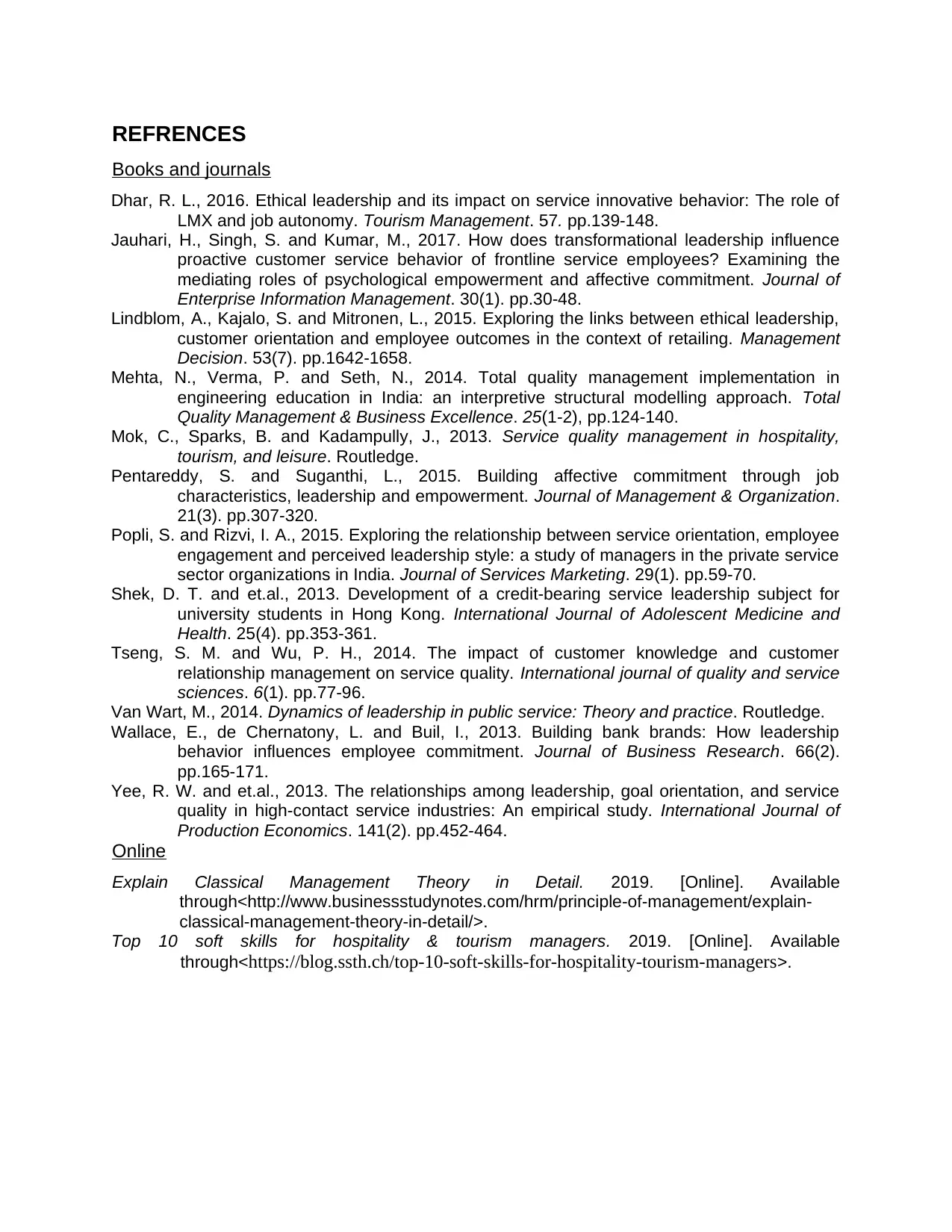
REFRENCES
Books and journals
Dhar, R. L., 2016. Ethical leadership and its impact on service innovative behavior: The role of
LMX and job autonomy. Tourism Management. 57. pp.139-148.
Jauhari, H., Singh, S. and Kumar, M., 2017. How does transformational leadership influence
proactive customer service behavior of frontline service employees? Examining the
mediating roles of psychological empowerment and affective commitment. Journal of
Enterprise Information Management. 30(1). pp.30-48.
Lindblom, A., Kajalo, S. and Mitronen, L., 2015. Exploring the links between ethical leadership,
customer orientation and employee outcomes in the context of retailing. Management
Decision. 53(7). pp.1642-1658.
Mehta, N., Verma, P. and Seth, N., 2014. Total quality management implementation in
engineering education in India: an interpretive structural modelling approach. Total
Quality Management & Business Excellence. 25(1-2), pp.124-140.
Mok, C., Sparks, B. and Kadampully, J., 2013. Service quality management in hospitality,
tourism, and leisure. Routledge.
Pentareddy, S. and Suganthi, L., 2015. Building affective commitment through job
characteristics, leadership and empowerment. Journal of Management & Organization.
21(3). pp.307-320.
Popli, S. and Rizvi, I. A., 2015. Exploring the relationship between service orientation, employee
engagement and perceived leadership style: a study of managers in the private service
sector organizations in India. Journal of Services Marketing. 29(1). pp.59-70.
Shek, D. T. and et.al., 2013. Development of a credit-bearing service leadership subject for
university students in Hong Kong. International Journal of Adolescent Medicine and
Health. 25(4). pp.353-361.
Tseng, S. M. and Wu, P. H., 2014. The impact of customer knowledge and customer
relationship management on service quality. International journal of quality and service
sciences. 6(1). pp.77-96.
Van Wart, M., 2014. Dynamics of leadership in public service: Theory and practice. Routledge.
Wallace, E., de Chernatony, L. and Buil, I., 2013. Building bank brands: How leadership
behavior influences employee commitment. Journal of Business Research. 66(2).
pp.165-171.
Yee, R. W. and et.al., 2013. The relationships among leadership, goal orientation, and service
quality in high-contact service industries: An empirical study. International Journal of
Production Economics. 141(2). pp.452-464.
Online
Explain Classical Management Theory in Detail. 2019. [Online]. Available
through<http://www.businessstudynotes.com/hrm/principle-of-management/explain-
classical-management-theory-in-detail/>.
Top 10 soft skills for hospitality & tourism managers. 2019. [Online]. Available
through<https://blog.ssth.ch/top-10-soft-skills-for-hospitality-tourism-managers>.
Books and journals
Dhar, R. L., 2016. Ethical leadership and its impact on service innovative behavior: The role of
LMX and job autonomy. Tourism Management. 57. pp.139-148.
Jauhari, H., Singh, S. and Kumar, M., 2017. How does transformational leadership influence
proactive customer service behavior of frontline service employees? Examining the
mediating roles of psychological empowerment and affective commitment. Journal of
Enterprise Information Management. 30(1). pp.30-48.
Lindblom, A., Kajalo, S. and Mitronen, L., 2015. Exploring the links between ethical leadership,
customer orientation and employee outcomes in the context of retailing. Management
Decision. 53(7). pp.1642-1658.
Mehta, N., Verma, P. and Seth, N., 2014. Total quality management implementation in
engineering education in India: an interpretive structural modelling approach. Total
Quality Management & Business Excellence. 25(1-2), pp.124-140.
Mok, C., Sparks, B. and Kadampully, J., 2013. Service quality management in hospitality,
tourism, and leisure. Routledge.
Pentareddy, S. and Suganthi, L., 2015. Building affective commitment through job
characteristics, leadership and empowerment. Journal of Management & Organization.
21(3). pp.307-320.
Popli, S. and Rizvi, I. A., 2015. Exploring the relationship between service orientation, employee
engagement and perceived leadership style: a study of managers in the private service
sector organizations in India. Journal of Services Marketing. 29(1). pp.59-70.
Shek, D. T. and et.al., 2013. Development of a credit-bearing service leadership subject for
university students in Hong Kong. International Journal of Adolescent Medicine and
Health. 25(4). pp.353-361.
Tseng, S. M. and Wu, P. H., 2014. The impact of customer knowledge and customer
relationship management on service quality. International journal of quality and service
sciences. 6(1). pp.77-96.
Van Wart, M., 2014. Dynamics of leadership in public service: Theory and practice. Routledge.
Wallace, E., de Chernatony, L. and Buil, I., 2013. Building bank brands: How leadership
behavior influences employee commitment. Journal of Business Research. 66(2).
pp.165-171.
Yee, R. W. and et.al., 2013. The relationships among leadership, goal orientation, and service
quality in high-contact service industries: An empirical study. International Journal of
Production Economics. 141(2). pp.452-464.
Online
Explain Classical Management Theory in Detail. 2019. [Online]. Available
through<http://www.businessstudynotes.com/hrm/principle-of-management/explain-
classical-management-theory-in-detail/>.
Top 10 soft skills for hospitality & tourism managers. 2019. [Online]. Available
through<https://blog.ssth.ch/top-10-soft-skills-for-hospitality-tourism-managers>.
1 out of 11
Related Documents
Your All-in-One AI-Powered Toolkit for Academic Success.
+13062052269
info@desklib.com
Available 24*7 on WhatsApp / Email
![[object Object]](/_next/static/media/star-bottom.7253800d.svg)
Unlock your academic potential
Copyright © 2020–2026 A2Z Services. All Rights Reserved. Developed and managed by ZUCOL.





